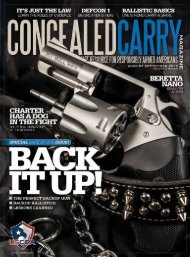Download This Issue - US Concealed Carry
Download This Issue - US Concealed Carry
Download This Issue - US Concealed Carry
You also want an ePaper? Increase the reach of your titles
YUMPU automatically turns print PDFs into web optimized ePapers that Google loves.
BUYING GUNS ONLINE<br />
Red Flags<br />
to watch<br />
out for:<br />
• Little or no sales history in a vendor<br />
• Low or no customer feedback<br />
ratings.<br />
• Sellers demanding cash only<br />
• Sellers who don’t want to answer<br />
your questions or don’t answer<br />
them to your satisfaction<br />
• Sellers who offer shortcuts on the<br />
transfer process or paperwork<br />
(HUGE red flag!)<br />
• Sellers who don’t provide contact<br />
information<br />
• Sellers who don’t accept returns<br />
reserve price, a minimum price below<br />
which the seller is not obliged to sell the<br />
gun, automatic bidding will attempt to<br />
meet the reserve price. Pay attention to<br />
the reserve price: You can be the high<br />
bidder on an auction and still not win it<br />
because the reserve price has not been<br />
met.<br />
Many gun auctions have a “buy now”<br />
price, meaning if you have a burning<br />
desire for a particular piece and<br />
don’t want to trust to your luck in the<br />
auction, you can “buy it now” for that<br />
price. For example, my wife likes 1911s<br />
and has a birthday coming up. I found<br />
a Colt Series 70 Combat Commander<br />
on GunBroker.com. Bidding on it will<br />
continue for four days and three hours<br />
and the current bid is $630. The buy<br />
now price is $1,200. If I’m satisfied that<br />
my wife will really like this particular<br />
Commander, I can skip the bidding and<br />
pay the seller’s buy now price to buy the<br />
item without having to bid on it.<br />
As the end of bidding approaches, the<br />
prices bid will likely go up. If I want to<br />
bid on the Commander in our example,<br />
I can either use the automated bidding<br />
process mentioned earlier, or use the<br />
“Watch” feature to follow the bidding,<br />
and raise my bids as long as it isn’t more<br />
than I want to pay. If the bidding goes<br />
beyond what I want to pay, well, there’s<br />
always another auction!<br />
How does an auction end? It’s sort of<br />
like a live auction, but not quite. There’s<br />
no live auctioneer shouting “Going,<br />
Going, Gone!” but most auction internet<br />
sites have something similar.<br />
GunBroker.com, for example, has a “15<br />
Minute Rule” which just means that an<br />
auction doesn’t close until there has<br />
been no bidding activity for 15 minutes.<br />
<strong>This</strong> allows everyone a fair chance to<br />
bid on the item.<br />
Having successfully bid on a weapon,<br />
what’s next? Contact the seller to arrange<br />
payment (including shipping and<br />
transfer fees) and transfer of the item.<br />
Payment is usually via PayPal, a credit<br />
card or a money order, although some<br />
vendors accept personal checks and wait<br />
for the check to clear before shipping<br />
the item. By federal law, all interstate<br />
transfers of firearms must be through<br />
Federal Firearms Licensees. Contact an<br />
FFL near you and arrange their receipt<br />
of the gun for you. A signed copy of your<br />
FFL’s current federal firearms license<br />
will be sent to the shipping FFL, who<br />
will then ship the weapon to your FFL<br />
in strict accordance with all applicable<br />
federal and local laws and regulations.<br />
Pay special attention to the gun<br />
laws in your state. In the early days of<br />
online gun sales, I lusted after a North<br />
American Arms Guardian in .32 ACP.<br />
I was living in Maryland at the time,<br />
which banned the sale of the NAA<br />
Guardian for reasons known only to<br />
the Maryland Handgun Roster Board.<br />
It wasn’t until after I had won the<br />
auction that I discovered it was illegal<br />
to own an NAA Guardian in Maryland!<br />
Fortunately, the seller let me back out<br />
of the sale, but most gun sales sites now<br />
have prominent language reminding<br />
bidders it is their responsibility to<br />
check the laws of their states for the<br />
legality of owning a particular firearm<br />
or accessory.<br />
If you don’t know of an FFL to receive<br />
your newly-purchased firearm, don’t despair.<br />
Most sales sites have lists of FFLs<br />
in every state willing to receive firearms<br />
transfers for you. If you plan on buying<br />
a lot of guns online, I suggest shopping<br />
for an FFL to receive your purchases<br />
in the same way that you shop for firearms—which<br />
is very carefully. Fees for<br />
sending and receiving guns are set by<br />
the individual FFL and they will vary.<br />
In my hometown, Las Vegas, Nevada, I<br />
have seen quotes for a firearms transfer<br />
range from a low of $25 to a high of<br />
$100, with something between $25 - $50<br />
36<br />
<strong>US</strong>CONCEALEDCARRY.COM n CONCEALED CARRY MAGAZINE n MAY/JUNE 2011
















